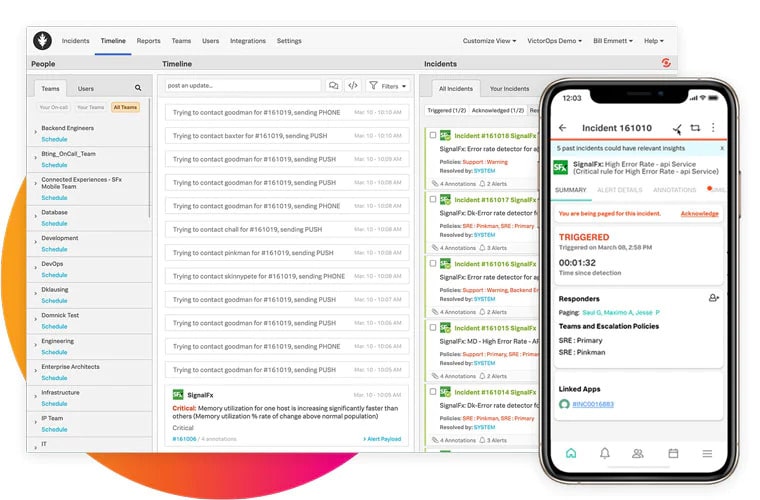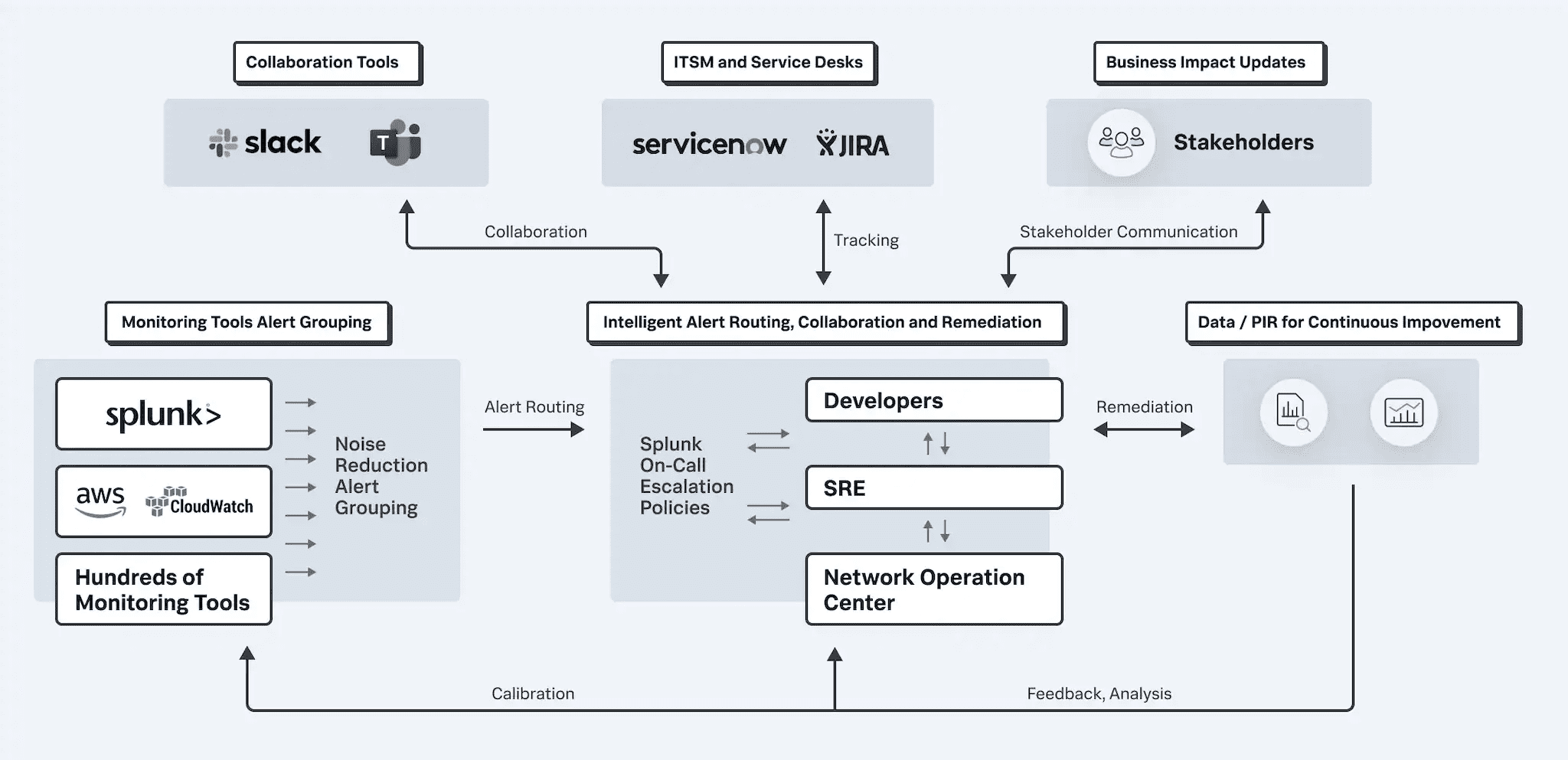VictorOps, now called Splunk On-Call, is an incident response management system that sends alerts immediately, so you can remediate incidents before they impact the end-user.
This robust tool takes a DevOps approach to incident management and, in the process, empowers you to collaborate with your team members to come up with the most effective solutions.
Sounds interesting?
Read on, we explore the features of this tool and review their effectiveness.
Features of Victorops

Victorops comes with many advanced features that streamline the entire incident response faster, so you can address the issue quickly and save on the costs associated with a delayed response.
Here's a look at these features.
- Minimizes false positives with its built-in intelligence
- Allows you to customize alerts to meet your specific needs.
- Provides contextual information about each incident to speed up the resolution process
- Comes with user-first reports to help with continuous learning
- Offers native iOS and Android apps to help stay on top of your infrastructure even if you're on the go.
- Supports scheduling and escalations to help remediate the issue at the earliest.
- Automates key processes to reduce the time to learn after an incident occurs.
- Integrates well with existing toolkits.
- Displays historically similar incidents to provide a better context and audit trail for incident resolution.
- Supports a rules engine for improved triage.
- Uses machine learning to recommend the right responders for each incident.
- Supports a CI/CD pipeline for quick sprints and iterations. It integrates well with popular CI/CD tools such as Kubernetes, Azure, Google Cloud Platform, and AWS.
- Provides in-depth observability into issues.
Overall, Victorops improves business outcomes and reduces costs with its automated incident handling.
Now that we have an idea of the features let's take a detailed look into how it works.
Working of Victorops

Victorops is often deployed along with other monitoring tools, and it works in tandem with the other group tools to reduce noise. When an incident occurs, it uses the intelligent alert routing, collaboration, and remediation features to escalate it to the appropriate developers, SREs, and the network operation center.
It also integrates with Teams, Slack, Jira, and other DevOps tools to send alerts and follow up on the organization’s actions with the different stakeholders.
As a part of remediation, Victorops generates reports to form the basis for continuous improvement in processes. Along with these, the feedback, analysis, and calibration loops back to achieve the desired results in the form of reduced costs and efforts and minimal impact to users.
Pricing
Victorops or Splunk On-Call offers three pricing plans, and they are:
- Starter – $5/month. This is a good choice for small teams with up to 10 members.
- Growth – $23/month. This plan works well for DevOps teams that want to streamline the incident handling process.
- Enterprise – $25/month. This plan has expensive features, including cross-team access, reporting, alert routing, and more.
Why use Victorops?
Victorsops provides many benefits for an organization.
Here's a look at some of the reasons to use this tool.
- Reduces the Mean Time to Repair (MTTR).
- Helps to understand workflows and other correlated data better.
- There are no dead ends or blind spots when you use Victorops.
- Uses an open standards-based agent so that you can integrate the data with other tools for comprehensive visibility.
- Provides an optimized customer experience.
- Eliminates guesswork as you can address issues with the correct data.
- Works well across any stack or infrastructure.
- Automates the incident response and sends the alerts to the concerned person for quick remediation.
- Improves collaboration across groups and teams.
In all, Victorops can provide a streamlined incident handling process for organizations where the right stakeholders can collaborate across teams and have access to the contextual data for speedy remediation. All these improve the end-user experience as issues tend to get fixed before it impacts them and, at the same time, helps businesses to save on costs and resources.
Is Victorops Right For You?
So far, we have seen the features of Victorops and how they can benefit your organization.
But is this the right incident management tool for your organization?
Logs and Traces
First off, it's important to note that the usefulness of Victorops depends to a large extent on the way your infrastructure is set up, especially the logging and monitoring aspects, because Victorops may not be able to make relevant recommendations if there is poor or limited logging within your infrastructure.
Victorops leverages the information from logs and other monitoring tools to make intelligent predictions, and if these data are unavailable, then Vicroops is reduced to a mere alerting tool. Further, it can't provide any contextual information, so it may not help with remediation either.
All this means you must focus on your logging and monitoring to make the most of what Vicrotops can offer for you.
Outsourcing
As a company, if you prefer to outsource your alerting system to a third-party tool and not bother about managing it internally, Victorops can work for you.
Out of the many tools available today, Victorops is a popular choice because it eases the process of alerting and remediation and can be a good choice if you have a more outsourced than internally-managed work environment.
DevOps
If you have a dynamic DevOps process and team, Victorops is a good choice as it integrates well with any CI/CD pipeline. It also eases the communication and collaboration process among teams, and this adds to its efficacy as well,
Victorops also strives to create a well-coordinated environment where on-call schedules are rotated and managed well. The same can be coordinated through popular communication tools such as Slack.
Thus, if your organization has a well-oiled CI/CD pipeline or if you're planning to set one in place soon, Victorops can fit in well with the infrastructure.
Extensive Support
A distinguishing feature of Victorops is its support.
This company offers support via email, help desk, phone, and chat. Besides this, it has an extensive knowledge base with answers to the most frequently asked questions, training videos, webinars, and in-person appointments to answer any concerns or questions you may have.
So, if you're looking for extensive customer support, Victorops is the platform for you.
Reports and Audit Trails
Operate in an industry that is heavily regulated, like finance or insurance. Victorops can provide an easy audit trail of your incidents that can, in turn, be used for easing internal and external audits.
Further, it generates reports in many formats that can be used to inform your internal and external stakeholders about your infrastructure. These can also come in handy for the operations team to manage errors better.
Finally, let's wrap up with the pros and cons of Victorops.
Pros of Victorops
Some of the essential pros of Victorops are:
- Comes with top-notch customer support. It also has detailed documentation and is backed by a vibrant community of users.
- It is easy to set up and manage and doesn't require technical expertise or experience.
- Works well for a DevOps pipeline.
- Ideal for reporting and compliance.
Cons of Victorops
Some of the cons of Victorops are:
- Overriding or changing schedules is not straightforward and requires additional steps and interventions.
- The user interface can be a bit clunky for some users, based on their personal preferences.
To conclude, Victorops is a robust and efficient incident management system, though we would need logs and traces set up in your environment to leverage its full potential.
While Victorops offers a lot of flexibility, it is not ideal for every situation. So, here are some alternatives for Victorops to consider.
Alternatives to Victorops
Some of the alternatives to Victorops are:
1. OpsGenie
OpsGenie alerting and incident management platform aggregates alerts and notifications across your entire infrastructure, prioritizes them using its intelligent capabilities, and sends notifications to the right people through various communication channels. Its advanced features reduce false positives, while its routing rules make it flexible for any environment or workload.
2. AlertOps
AlertOps is a real-time automated incident management system that enables users to rapidly identify, respond, and resolve an issue before impacting the end-users. It is well-suited for ITOps and DevOps teams, thanks to its role-based security and enterprise team management features. In addition, its integration with the most well-known tools is a bonus.
3. PagerDuty
PagerDuty is a SaaS-based incident platform that integrates human intelligence and machine learning in real-time to improve visibility across the entire organization. It takes a proactive and preventive approach to protect your critical apps and services. This robust tool also helps make sense of the data collection to reinforce learning and improve the decision-making process.
4. xMatters
xMatters is a reliable platform that helps DevOps and SREs automate workflows and ensure that the infrastructure is available for the critical components at all times. Its readymade integrations and flexible APIs help to deliver quality products at scale, while its adaptive incident management reduces the business impact of critical issues and incidents.
5. Blameless
Blameless is an end-to-end SRE platform that empowers teams to increase their platform's reliability and, at the same time, encourages innovation. It automates context and workflow to provide a seamless and unique experience for your end-users while helping your team take a proactive approach to incident response and management.
We hope this article helps you zero in on the right incident response management tool that best fits your organization's needs.




